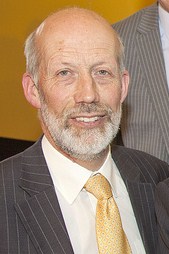David Ford (politician) facts for kids
Quick facts for kids
David Ford
|
|
|---|---|
 |
|
| Minister of Justice | |
| In office 12 April 2010 – 6 May 2016 |
|
| First Minister | Peter Robinson (FM) Martin McGuinness (dFM) |
| Preceded by | Office established |
| Succeeded by | Claire Sugden |
| Leader of the Alliance Party | |
| In office 6 October 2001 – 6 October 2016 |
|
| Deputy | Eileen Bell Naomi Long |
| Preceded by | Seán Neeson |
| Succeeded by | Naomi Long |
| Member of the Legislative Assembly for South Antrim |
|
| In office 25 June 1998 – 25 June 2018 |
|
| Preceded by | Constituency established |
| Succeeded by | John Blair |
| Member of Antrim Borough Council |
|
| In office 5 May 2005 – 5 May 2011 |
|
| Preceded by | Sean McKee |
| Succeeded by | Neil Kelly |
| Constituency | Antrim Town |
| In office 19 May 1993 – 7 June 2001 |
|
| Preceded by | Roy Stinson |
| Succeeded by | Martin McManus |
| Constituency | Antrim South East |
| Personal details | |
| Born | 24 February 1951 Orpington, Kent, England, UK |
| Political party | Alliance |
| Spouse | Anne Ford |
| Children | 4 |
| Alma mater | Queen's University Belfast |
| Occupation | Politician |
| Profession | Social Worker |
| Website | Official webpage: http://www.davidford.org |
David Ford (born 24 February 1951) is a former politician from Northern Ireland. He was the leader of the Alliance Party of Northern Ireland for 15 years, from October 2001 to October 2016. He also served as the Northern Ireland Minister of Justice from April 2010 to May 2016. For 20 years, from 1998 to 2018, he was a Member of the Northern Ireland Assembly (MLA) representing the area of South Antrim.
Contents
Early Life and Education
David Ford was born on February 24, 1951, in Orpington, England. His parents were from Ireland and Wales. He went to primary school in Orpington and then to Dulwich College in London.
During his summer breaks, David visited his uncle's farm in County Tyrone, Northern Ireland. In 1969, he moved to Northern Ireland permanently. He went to Queen's University Belfast (QUB) to study Economics. While at university, he joined the student group for the Alliance Party.
After graduating, David spent a year volunteering at the Corrymeela Community. This community works to bring people from different backgrounds together. In 1973, he began working as a Social Worker, helping people in need.
Political Journey
David Ford became more involved in politics over time. He first tried to get elected to the Antrim Borough Council in 1989 but was not successful. Later, he started working full-time as the general secretary for the Alliance Party. In this role, he helped the party organize better and connect with local communities.
In 1993, he was elected to the Antrim Borough Council. He served there again in 1997 and 2005. In 1998, David Ford was elected to the Northern Ireland Assembly. This is where laws are made for Northern Ireland. He represented the South Antrim area. He continued to be elected as an MLA for South Antrim until 2018.
Leading the Alliance Party
In 2001, the previous leader of the Alliance Party, Seán Neeson, stepped down. David Ford was chosen as the new leader on October 6, 2001. He won the election with 86 votes.
As leader, David Ford helped bring stability to the Alliance Party. He wanted the party to work with other groups in Northern Ireland that were not focused on old divisions. He believed Northern Ireland could learn from other places in the world that had worked for peace.
In 2001, David Ford and some of his colleagues made a special move to help the government keep working. They temporarily changed their political group in the Assembly for a short time. This helped the First Minister, David Trimble, stay in his position. This action allowed the government to continue for another year.
In the 2003 Assembly elections, many people thought David Ford might lose his seat. However, he worked hard and managed to keep his position. His personal vote actually increased in South Antrim. The Alliance Party kept all six of its seats in the Assembly.
The party saw more success in the 2007 Northern Ireland Assembly election. They received more votes than they had in a long time. David Ford was elected third in South Antrim. In the 2011 Assembly elections, the Alliance Party grew even more. They gained an extra seat and became a stronger force in Belfast.
David Ford announced he would step down as leader in October 2016. This was 15 years after he first became leader. He felt it was the right time for a new leader to guide the party forward.
Northern Ireland Justice Minister
On April 12, 2010, David Ford was chosen to be Northern Ireland's first Justice Minister in 38 years. This was a very important role. He was supported by several different political parties in the Assembly.
As Justice Minister, he was responsible for things like law and order, courts, and prisons in Northern Ireland. He worked to provide leadership and ensure justice for everyone.
Personal Life
David Ford is married to Anne Ford. They have four grown-up children. They live in the countryside of County Antrim.
See also
 | Lonnie Johnson |
 | Granville Woods |
 | Lewis Howard Latimer |
 | James West |

